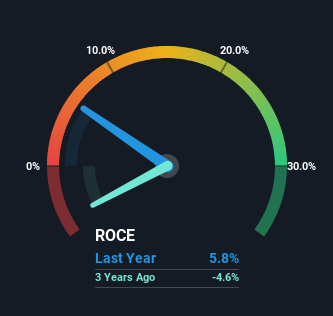- Singapore
- /
- Trade Distributors
- /
- SGX:BDU
Federal International (2000) (SGX:BDU) Is Experiencing Growth In Returns On Capital

If you're not sure where to start when looking for the next multi-bagger, there are a few key trends you should keep an eye out for. In a perfect world, we'd like to see a company investing more capital into its business and ideally the returns earned from that capital are also increasing. Ultimately, this demonstrates that it's a business that is reinvesting profits at increasing rates of return. So when we looked at Federal International (2000) (SGX:BDU) and its trend of ROCE, we really liked what we saw.
Return On Capital Employed (ROCE): What Is It?
For those that aren't sure what ROCE is, it measures the amount of pre-tax profits a company can generate from the capital employed in its business. To calculate this metric for Federal International (2000), this is the formula:
Return on Capital Employed = Earnings Before Interest and Tax (EBIT) ÷ (Total Assets - Current Liabilities)
0.058 = S$4.2m ÷ (S$94m - S$22m) (Based on the trailing twelve months to June 2023).
Therefore, Federal International (2000) has an ROCE of 5.8%. Ultimately, that's a low return and it under-performs the Trade Distributors industry average of 8.6%.
See our latest analysis for Federal International (2000)

While the past is not representative of the future, it can be helpful to know how a company has performed historically, which is why we have this chart above. If you'd like to look at how Federal International (2000) has performed in the past in other metrics, you can view this free graph of past earnings, revenue and cash flow.
What The Trend Of ROCE Can Tell Us
Shareholders will be relieved that Federal International (2000) has broken into profitability. The company now earns 5.8% on its capital, because five years ago it was incurring losses. Interestingly, the capital employed by the business has remained relatively flat, so these higher returns are either from prior investments paying off or increased efficiencies. So while we're happy that the business is more efficient, just keep in mind that could mean that going forward the business is lacking areas to invest internally for growth. So if you're looking for high growth, you'll want to see a business's capital employed also increasing.
In Conclusion...
To bring it all together, Federal International (2000) has done well to increase the returns it's generating from its capital employed. Given the stock has declined 39% in the last five years, this could be a good investment if the valuation and other metrics are also appealing. That being the case, research into the company's current valuation metrics and future prospects seems fitting.
If you want to continue researching Federal International (2000), you might be interested to know about the 2 warning signs that our analysis has discovered.
While Federal International (2000) isn't earning the highest return, check out this free list of companies that are earning high returns on equity with solid balance sheets.
New: AI Stock Screener & Alerts
Our new AI Stock Screener scans the market every day to uncover opportunities.
• Dividend Powerhouses (3%+ Yield)
• Undervalued Small Caps with Insider Buying
• High growth Tech and AI Companies
Or build your own from over 50 metrics.
Have feedback on this article? Concerned about the content? Get in touch with us directly. Alternatively, email editorial-team (at) simplywallst.com.
This article by Simply Wall St is general in nature. We provide commentary based on historical data and analyst forecasts only using an unbiased methodology and our articles are not intended to be financial advice. It does not constitute a recommendation to buy or sell any stock, and does not take account of your objectives, or your financial situation. We aim to bring you long-term focused analysis driven by fundamental data. Note that our analysis may not factor in the latest price-sensitive company announcements or qualitative material. Simply Wall St has no position in any stocks mentioned.
About SGX:BDU
Federal International (2000)
An investment holding company, operates as an integrated service provider and procurement specialist in the oil and gas, and energy industries in Indonesia, Japan, the People’s Republic of China, Singapore, Thailand, the United Kingdom, Vietnam, and internationally.
Adequate balance sheet low.
Market Insights
Community Narratives


